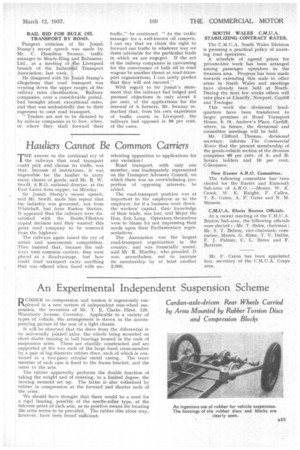Hauliers Cannot Be Common Carriers T HE answer to the continual
Page 47

If you've noticed an error in this article please click here to report it so we can fix it.
cry of the railways that road transport could pick and choose its traffic was that, because of restrictions, it was impossible far the haulier to carry many classes of goods, said Mr. R. W. Sewill, A.R.0, national director, at the East Lanes Area supper, on Monday.
Sir Josiah Stamp's recent speech, said Mr. Sewn!, made him repeat that the industry was governed, not from Whitehall, but from Euston Station. It appeared that the railways were dissatisfied with the Bouts-Tillotson appeal decision and they wanted this great road company to be removed from the highway.
The railways again raised the cry of unfair and uneconomic competition. They insisted that, because the railways were common carriers, they were placed at a disadvantage, but how could road transport carry anything that was offered when faced with un
relenting opposition to applications for any variation?
Road transport, with only one member, was inadequately represented on the Transport Advisory Council, on which there was an overwhelming proportion of opposing interests, he added.
The road-transport position was as important to the employee as to the employer, for if a business went down, the workers' "capital, their knowledge of their trade, was lost, said Major the Hon. Eric Long. Operators themselves were to blame for not impressing their needs upon their Parliamentary representatives.
The Association was the largest road-transport organization in the country, and was financially sound, said Mr. R. Hinclley, who presided. It was, nevertheless, out to increase its membership by at least another 2,000.




















































































